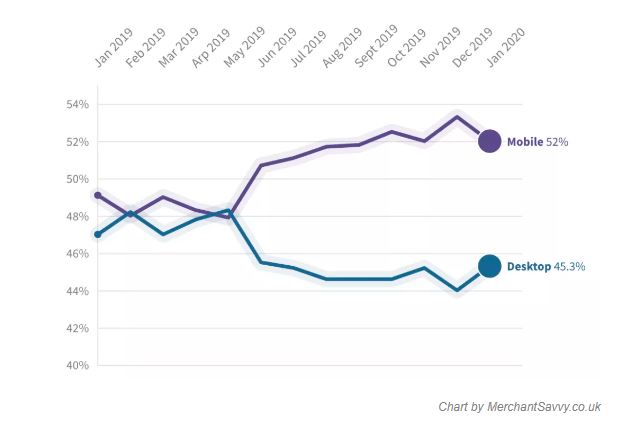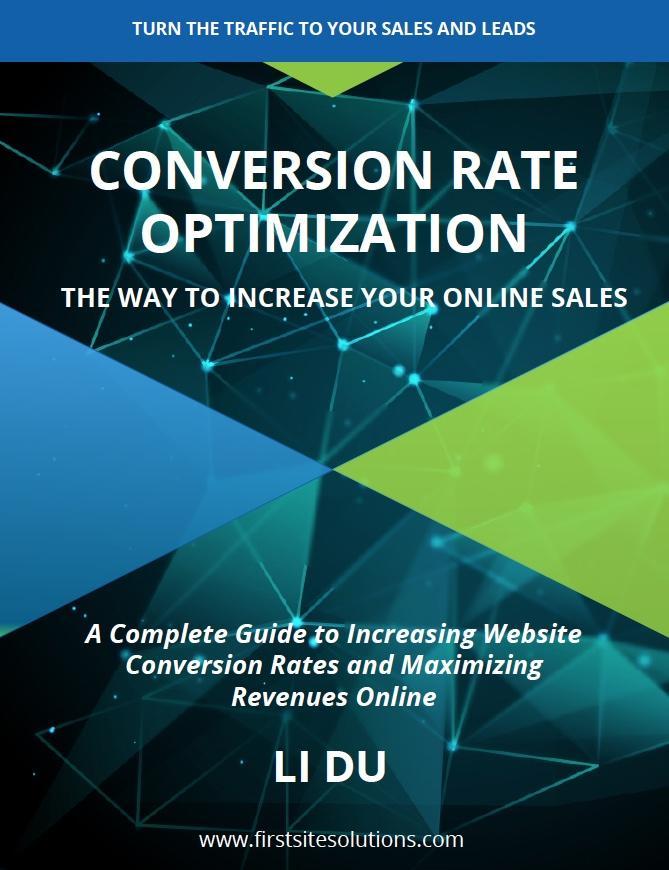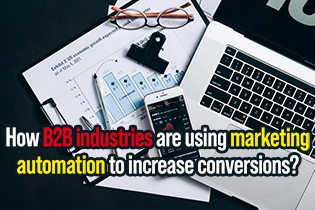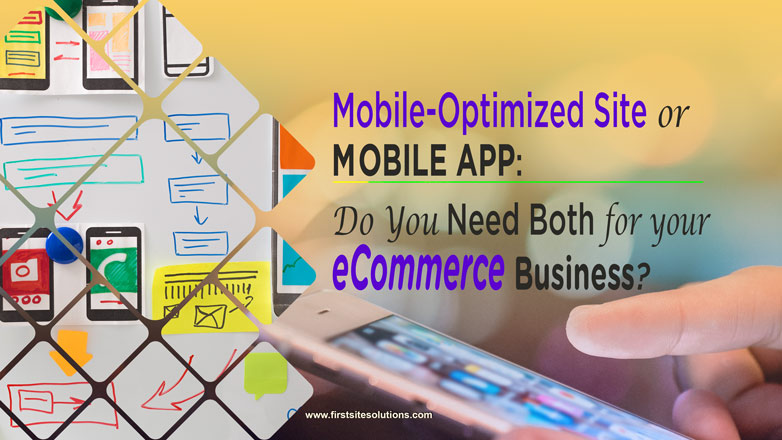
Creating a mobile-optimized website and a mobile app for your eCommerce business is not an easy undertaking, which is why the question of whether to build one over the other, or to go for both, is of utmost importance for success.
Research shows that eCommerce businesses fail 80 percent of the time.
The reasons for such a high failure rate are many, but the chances of developing a lucrative eCommerce brand can be greatly enhanced by keeping on top of technological trends and choosing the right platform from which to sell your products.
So, which one will give your business a fighting chance to not only survive but thrive?
In the following sections, we will expand on the pros and cons of each, so you can make the most informed decision possible.
Of course, if you have the money and resources to build both—problem solved!
However, most eCommerce startups lack the budget, time and resources to set up both, at least in the beginning.
So, if you have to choose only one for your business, then it is best to be armed with as much information about the benefits and drawbacks of both.
In the end, you know your business best, so take the information in the following sections and compare them with what your eCommerce business needs.
This will enable you to make the best decision possible.

Having a Mobile Presence Is Necessary for eCommerce
You are going to need an online presence for your eCommerce business, or you won’t have a business at all.
This should be obvious.
However, what may not be so obvious is how important having a mobile-friendly platform is for your eCom biz.
The following statistics will give you a good idea of why your eCommerce business will be dead in the water if it is not accessible through mobile:
- 40 percent of consumers will click over to a competitor’s site if they don’t have a good mobile user experience.
- 72 percent of consumers state that they are more likely to buy a product or service if it comes from a mobile-friendly site.
- 50 percent of searches done through mobile lead to a purchase decision.
The stats above prove that if you want to compete and generate revenue in the eCommerce space, you are going to have to have a platform that is accessible through the internet.
Moreover, the platform will also have to be accessible through a mobile device — be that a mobile-optimized site, a mobile app, or both.
Mobile Sites and Mobile Apps: Similarities and Differences
Mobile sites and mobile apps are similar and different at the same time, which can make it confusing to judge which one is better for your eCom biz.
However, knowing how they are alike and how they are different is an essential first step to making a sound judgment as to which one will serve your business objectives best.
First, let’s look at how they are similar. They both:
- can be accessed and viewed through a mobile device (smartphone or tablet).
- contain features that work only on mobile devices (geo-location, Click-to-Call).
- incorporate design elements that make eCommerce stores look good when viewed on a mobile device.
- offer social sharing capabilities.
- have mobile marketing function capabilities.
- can be formatted and structured for eCommerce and mCommerce (mobile commerce) stores.
Now, for their differences:
- Unlike a site, a mobile app has to be downloaded and installed on a mobile device to work.
- A mobile app can integrate with many features specific to mobile devices (camera, calendar, contact list, etc.).
- Certain mobile app features can be accessed without a WiFi connection, while a site depends on the internet.
- Communication between a business and its users is virtually on-demand through a mobile app.
Looking at the above similarities and differences, it would seem that creating a mobile app for an eCommerce business would be the best choice.
After all, they seem to offer a greater number of options to mobile users.
However, it is important not to make a quick decision in favor of developing a mobile app for your eCommerce business.
For the best results, you have to go through a comprehensive list of pros and cons for mobile-optimized sites and mobile apps.
Mobile Site: Pros & Cons
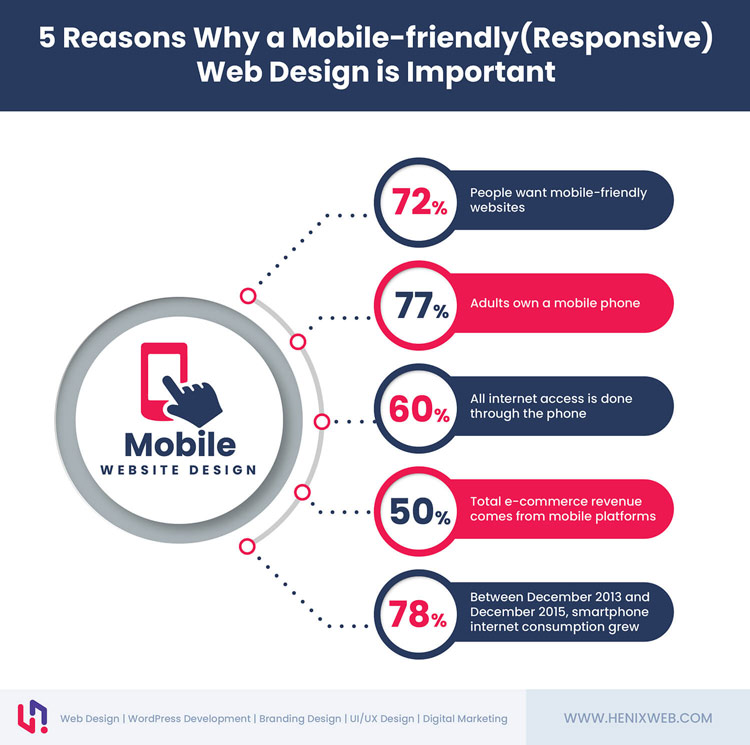
A mobile site is not the same as a website. Instead, it is a mobile version of a desktop website.
Mobile sites are designed specifically for mobile usage and therefore offer a better customer experience when they are viewed through a mobile device.
An eCommerce mobile site will not have as many pages as its desktop counterpart and will only include those pages that are optimized specifically for website viewability and usability through mobile devices.
Pros
Below you will find some compelling reasons for why you should develop a mobile-optimized site for your eCommerce brand:
- Mobile users will be able to access your site via their smartphones anytime they like. This equates to more views and more sales.
- Today's customers expect an eCommerce band to provide a mobile-friendly version of their main site, and therefore you should cater to their expectations and provide them with one, or risk losing them to your competitors. As many as 48 percent of customers are turned off by sites that aren’t mobile-friendly.
- Mobile users don’t need to download anything on their mobile devices to connect with a brand’s mobile site. A good 61 percent of consumers don’t want to download a new app for B2C communication.
- Mobile sites can boost search rankings for an eCommerce brand's main website and its mobile-optimized site simultaneously. In 2015, Google updated its ‘mobile-friendly algorithm’, making it very clear that they prioritize mobile-friendly sites in their ranking process.
- It is not that difficult to create a mobile-responsive website and garner all the advantages listed above if using a CMS (content management system) like WordPress and Joomla.
In short, a website is a practical option, yet it requires less commitment from the customer, which makes it appealing.
Cons
Now for the drawbacks of creating a mobile site for your brand:
- By utilizing only a desktop and mobile site, you won’t get app store exposure, which equates to a larger user base, lower acquisition costs, and more revenue.
- Mobile sites don’t allow push notifications. Push notifications enhance the customer experience as they provide useful information to customers and are less disruptive and annoying than other user engagement tools.
- Mobile sites can only be accessed while online.
- Mobile sites can not access as many mobile device features as mobile apps can.
- Mobile sites can not provide relevant information to mobile users on a single page.
All things considered, one of the main points to take away from this section is that Google favors mobile-optimized sites over desktop sites with little to no mobile usability and viewability.
So, if you are planning on getting a good portion of your traffic from Google, then you need to consider optimizing your site for mobile responsiveness and usability.
Otherwise, you will fail to get the amount of traffic you need for steady sales growth.
Mobile Apps: Pros & Cons
Mobile apps are tailor-made for mobile devices.
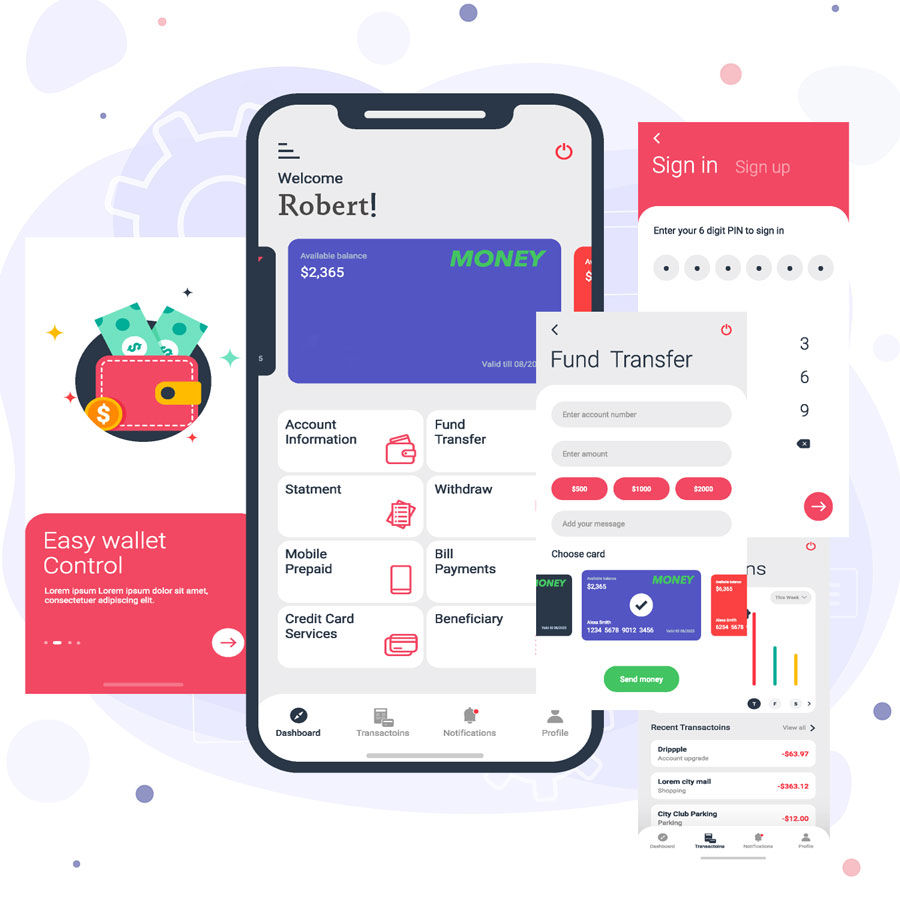
Unlike a website, which can be built for both desktop and mobile functionality, mobile apps are almost always created and designed specifically for mobile use.
In fact, the majority of apps can only be downloaded and used via a mobile device.
However, apps can do so much more for your business than simply give it a mobile presence.
Let’s look at some of their advantages.
Pros
A business can benefit greatly from having a custom app in a variety of areas:
- A mobile app will keep user attention on your eCommerce business each time they use their phone. Americans spend over two hours per day on their smartphones, and that too mainly viewing apps.
- Apps offer push notification capabilities that keep customers engaged and interested in your products and offers. Push notifications offer more value to users and therefore increase customer satisfaction and sales conversions.
- Apps help your brand stand out from your competition. Customers trust businesses that have brand software applications.
- Apps can extend your marketing strategy as they offer unique segmentation and targeting options not found on mobile sites.
- Having an app will allow your business to become its own marketing channel as you can advertise to customers directly and don’t have to rely solely on other ad networks to reach them.
- Apps help you answer customer questions almost instantly. Mobile apps can answer customer questions, giving them the ability to provide comments and suggestions without ever leaving the application - a better user experience and less churn rate for your business.
- Apps help create more customer loyalty through incentivized actions. Loyalty programs such as discounts, coupons, and points can be given to customers who frequently log into your app and make purchases through it.
- Mobile apps continue to function even when they are offline, meaning you can keep customers engaged with your business even when they have no internet access.
- Blog posts, videos, social posts, and all the other native resources created by your brand can be layered into a mobile app to enhance user experience and keep customers engaged even when they are not visiting your brand’s desktop site, mobile site, or social media accounts.
In short, apps extend your assets even further.
Cons
There are many advantages provided by mobile apps, but like mobile sites they too come with some drawbacks, such as the ones listed below:
- Mobile apps are hard to set up without employees or agencies that specialize in mobile app development.
- Mobile apps cost more to create than mobile websites. The development of a single app can cost anywhere from $30,000 to $50,000 and beyond depending on the complexity of the app.
- Apps need to be maintained regularly, which requires time, effort, and money. Failing to provide updates for your app may make it unusable for customers who have updated their phone to a newer version or a different brand.
- It's not easy to keep apps up-to-date and relevant, yet with the number of apps being uploaded regularly — 100,000 per month on average on Google Play Store alone — customers have come to expect constant improvements to user experience.
While it is extremely important to go over the pros and cons of both mobile sites and mobile apps separately, it is even more paramount to see how they stack up against one another.
This is particularly true for those areas that are most important to an eCommerce business.
It will make the decision process that much easier.
Mobile Sites vs. Mobile Apps in Practice
The comparisons between mobile apps and mobile sites will be the most significant in the following areas:
- Cost and Timeliness
- User Experience
- SEO (search engine optimization)
- Usability
- Marketing
- Maintenance
As can be seen from the above list, we will cover the main factors affecting both pre-development and post-development stages of mobile sites and mobile apps.
Cost & Timeliness
When it comes to cost-effectiveness and time sensitivity, eCommerce mobile sites trump mobile apps.
Mobile apps usually require a lot of upfront capital and can take up to six months sometimes to develop.
Today, there are lots of CMS (content management systems) catering specifically to eCommerce sites and their mobile-optimized counterparts.
Some of the more popular ones include:
- Shopify
- WooCommerce
- BigCommerce
- Magento
The above CMS solutions are more cost-effective than mobile apps and can be up and running in a week or less.
User Experience
The eCommerce experience requires a lot of actions which can potentially cause problems that lessen customer retention.
Mobile sites cannot provide the same quality of engagement and personalization as mobile apps.
Software applications offer unique engagement options and personalization settings that keep customers interested, safe, and happy.
These include :
- Offers
- Coupons
- Exclusive Ads
- Push Notifications
- Quick Order Tracking
- Fast Purchases
- Enhanced Security
Mobile apps beat mobile sites for in-depth personalization, engagement, and overall user experience.
SEO
If you are just starting and have no budget for paid advertising, then organic traffic is going to be your best bet for attracting interested parties.
In other words, you will need an eCommerce site that is optimized for mobile use to get Google and other search engines to rank your site, pages, and blog posts on their first-page listings.
The first page of Google gets around 71 percent of all website traffic.
And while you can get a lot of traffic from optimizing your app store listing (app store optimization) for the Apple App Store or Google Play, it pales in comparison to the amount of free traffic you can get by optimizing your mobile site for the search engines.
When it comes to free organic traffic, mobile sites are a clear winner.
Usability
Mobile apps and mobile sites can be accessed, viewed, and used via mobile devices when connected to the internet, but mobile apps have the added advantage of allowing user accessibility while offline.
Mobile applications can store important data like order id’s, purchase invoices, and recent products browsed on a user’s mobile device so they can view it even while offline.
Since users can stay connected with an eCommerce business 24/7 through mobile apps, those win the usability contest.
Marketing
Mobile sites and mobile apps can both utilize ad networks and social media platforms for their marketing, but only mobile apps can be marketed through app store listings.
App store marketing helps to lower acquisition costs, increase exposure to relevant users, and helps add more revenue for eCommerce businesses.
Mobile apps also help create a direct marketing channel between a brand and its users.
This helps lower marketing costs even further and increases customer loyalty and retention as brands can stay connected with their users and supply them with valuable offers and content every time they use their smartphones.
Mobile apps take the cake here.
Maintenance
eCommerce mobile sites and eCommerce apps both need routine security checks and have to continually be updated to stay in line with current trends and customer expectations.
For mobile sites, you can hire a web developer to keep them up-to-date.
However, for mobile apps, you need to hire two different app developers if you want to maximize your reach (Android and iOS development).
Nevertheless, through the latest cross-platform technology, it is possible to maintain your app for both Android and iOS simultaneously, thus cutting down on costs and resources.
Both need to be maintained and kept up-to-date, making this match a draw.
Conclusion
Mobile apps and mobile sites, when used together, help increase brand awareness, customer engagement, customer loyalty, and overall user experience.
If you don't have the time, money, or resources to build and develop both right now, then choose the best option - the one that best serves your eCommerce business.
By reviewing the pros, cons, and comparisons listed in this guide, you will be able to see which one gives your eCom biz more of a ‘push’ in the right direction than a ‘pull’ in the wrong one.
In short, choose the one that is going to give your brand more advantages than disadvantages at this point.
It really is as simple as that.

